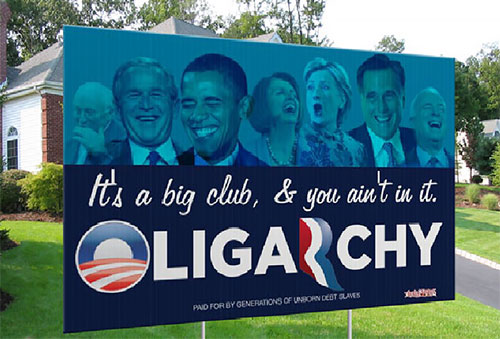
The U.S. government does not represent the interests of the majority of the country’s citizens, but is instead ruled by those of the rich and powerful, a new study from Princeton and Northwestern universities has concluded.
The report, “Testing Theories of American Politics: Elites, Interest Groups, and Average Citizens” (PDF), used extensive policy data collected between 1981 and 2002 to empirically determine the state of the U.S. political system.
After sifting through nearly 1,800 U.S. policies enacted in that period and comparing them to the expressed preferences of average Americans (50th percentile of income), affluent Americans (90th percentile), and large special interests groups, researchers concluded that the U.S. is dominated by its economic elite.















Mr. Bobbo,
There are too many questions and ideas floating around, many of them sprouting from my own posts. Let us please stick to one. I suggest the top of the list.
>>>Currency Debasement as or as not the same as taxation.
Here are a series of statements I find to be true and logical. Please take them at face value. Somewhere along this trail, we diverge. I am not attempting to hide any special meaning in between the lines. I am not trying to set you up for a trap. I am attempting to see where we diverge. Please indicate where.
If currency maintains its value, any growth in the economy should be the result of true growth (production increases) and not an apparent increase due to an increase in the number of dollars in circulation.
As long as government does not grow in size, the percentage of the GDP collected in tax revenue used to fund the government will be adequate from year to year. We shall assume there are no emergency measures encountered.
Inflation is shorthand for Inflation of the Money Supply. Increased costs are a symptom, not the cause, of inflation.
As inflation affects the value of money, companies/individuals requiring payment for services/goods increase their prices to compensate for their own lost wealth. This means the percentage of the GDP collected in tax revenue will no longer continue to fund the same amount of government services. There are not enough dollars.
The government solves this problem by borrowing money to pay the increased costs. Now these companies/individuals make more dollars because the government can pay them. But as the tax rate is the same, the government’s revenue collection, in dollars, increases appropriately as well. Therefore, the government’s services are not reduced. They are still able purchase x man-hours of goods and services.
So even in a fiat currency situation, as long as taxes remain steady, and government spending does not increase, and all other things remain equal (salaries keep up with inflation, etc.), the economy effectively moves along in steady state. Any growth outside of inflation is true growth.
Let’s not worry about the persistent debt just yet.
Do you agree with these statements?
TS